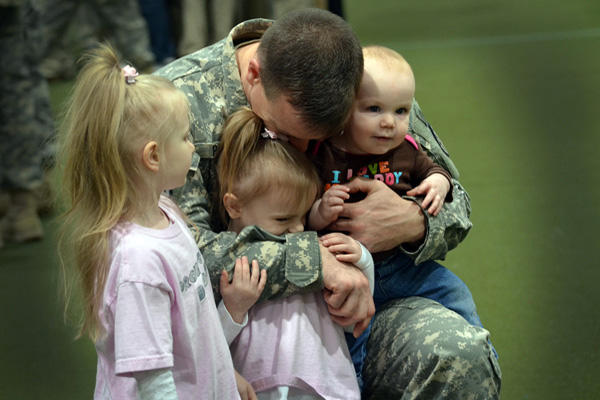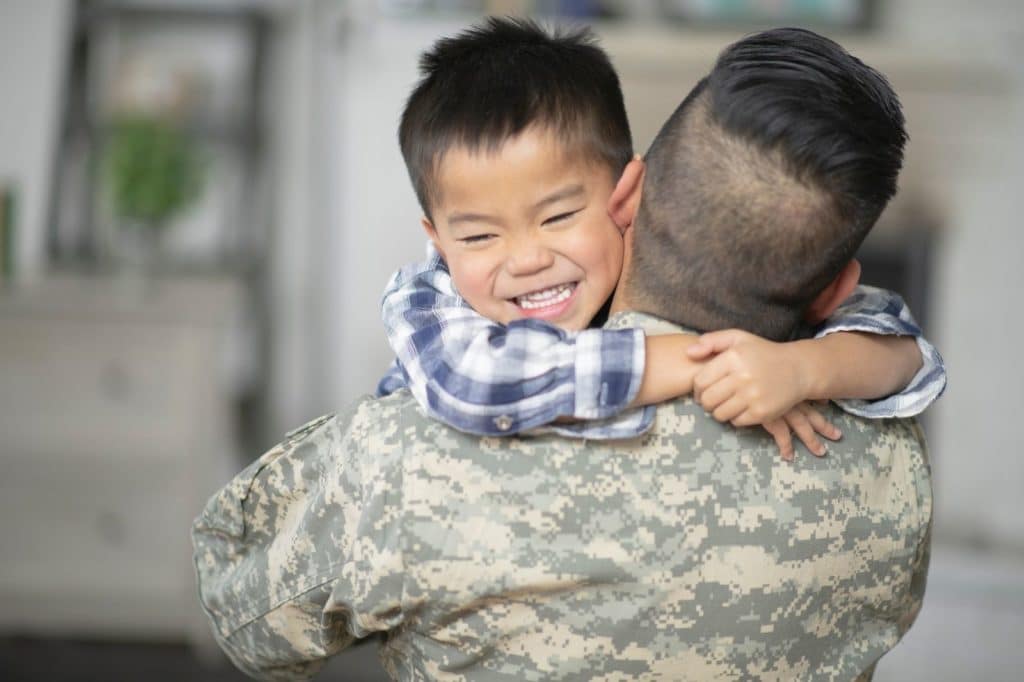Why Is Parenting in Military Families Challenging?
Parenting in military families is crucial due to frequent relocations disrupting routines, causing children to struggle with adjusting. Deployments lead to extended separations, affecting kids emotionally. Coping with uncertainty and stress during deployments is challenging, but effective communication and support networks help. Balancing military duties and parenting responsibilities requires careful time management and juggling priorities. Establishing routines, coping mechanisms, and prioritizing mental health are essential for stability. Support systems and resources exist to aid military families facing these challenges. Understanding these unique obstacles can help you navigate them with resilience and adaptability.
Key Takeaways
- Frequent relocations disrupt routines and academic stability for children.
- Extended parental separations during deployments impact children’s emotional well-being.
- Balancing military duties with parenting responsibilities poses time management challenges.
- Children face difficulties adjusting to new schools and communities due to constant change.
- Coping with uncertainty, stress, and maintaining mental health are crucial for military families.
Frequent Relocations Impact Family Stability

Frequently relocating due to military assignments can greatly impact the stability of family life, causing disruptions and challenges that require adaptability and resilience. The impact of moving on military families is profound, affecting not just the service member but also their spouse and children.
Each move brings a wave of mixed emotions – the excitement of new beginnings mingled with the stress of uprooting established routines and support systems.
Family stability can be shaken by the constant cycle of packing up, saying goodbye, and starting over in unfamiliar surroundings. Children may struggle to adjust to new schools, leaving behind friends and familiarity. Spouses often bear the responsibility of managing the household during deployments, adding another layer of stress to an already demanding situation.
Despite these challenges, military families demonstrate remarkable strength and unity in the face of frequent relocations. Building a strong support network within the military community and maintaining open communication within the family are essential tools for coping with the uncertainties of military life.
Through shared experiences and unwavering resilience, families can weather the storms of constant change and emerge even stronger.
Extended Periods of Parental Separation

You know the weight of separation when duty calls and loved ones must part ways, especially for extended periods in military families.
The impact of deployment on families is profound, requiring strength and resilience to navigate the challenges of distance.
When reintegration becomes the next chapter, it brings its own set of adjustments and hurdles to overcome.
Impact of Deployment
Extended periods of parental separation due to deployment can have a profound impact on children in military families, influencing their emotional well-being and overall development.
The mental health of children can be greatly affected when they’re separated from a parent for an extended period. They may experience feelings of sadness, anxiety, or even abandonment.
Utilizing effective communication strategies becomes essential during deployment to help children cope with the absence of a parent. Encouraging open conversations about emotions, maintaining regular contact through phone calls or video chats, and involving children in care package preparations can all contribute to easing the emotional strain caused by separation.
As a parent managing deployment, creating a supportive environment where children feel safe expressing their thoughts and emotions is crucial. By fostering strong lines of communication and providing reassurance throughout the separation, you can help mitigate the negative impact of prolonged parental absence on your children’s well-being.
Coping With Distance
During prolonged separations from a parent due to deployment, finding healthy ways to cope with the distance is important for both you and your children. Communication strategies play a significant role in maintaining a connection despite the physical separation. Regular video calls, emails, and letters can help bridge the gap and provide reassurance to both you and your children. Sharing daily experiences, even small details, can help keep the absent parent involved in family life.
Coping mechanisms are also necessary during these challenging times. Encouraging your children to express their feelings openly and honestly can help them process their emotions. Engaging in activities that promote relaxation and bonding, such as creating a family journal or participating in shared hobbies, can help build resilience and strengthen your family’s bond.
It’s crucial to validate your children’s emotions and provide them with a safe space to express their thoughts about the separation.
Reintegration Challenges
Maneuvering through the reintegration process after extended periods of parental separation can present unique challenges for military families. The reintegration struggles that come with adjusting back into family life after being apart for an extended period can take a toll on mental health and family relationships.
Returning home after deployment or long-term assignments can be both exciting and overwhelming. Adapting to being back together under the same roof mightn’t be as smooth as expected.
It’s common for children to have mixed feelings about the returning parent, as they’ve grown accustomed to the routines established during the separation. This period of adjustment can lead to misunderstandings, conflicts, and a need for readjustment on both sides.
It is important to approach reintegration with patience, open communication, and understanding. Recognizing and addressing the challenges that arise during this period can help strengthen family bonds and support everyone’s mental well-being as you navigate the complexities of coming back together after a prolonged separation.
Emotional Toll of Deployments on Children

As a military parent, you understand the profound emotional impact deployments can have on your children. The separation, uncertainty, and fear that come with deployments can take a toll on your child’s emotional resilience. Children may struggle to express their feelings, leading to pent-up emotions that can manifest in various ways.
It’s vital to create a safe space for open communication, encouraging your child to share their thoughts and emotions without judgment. Simple gestures like regular video calls, writing letters, or engaging in activities that help them express themselves can make a significant difference.
During deployments, children may experience a range of emotions, from sadness and anxiety to anger and confusion. It’s important to validate these feelings and provide reassurance that they’re normal reactions to the situation. By maintaining open lines of communication and actively listening to your child’s concerns, you can help them navigate the emotional challenges they face.
Your support and understanding can go a long way in helping your child build emotional resilience and cope with the difficulties of having a parent deployed.
Adjusting to New Schools and Communities

Adjusting to new schools and communities can present unique challenges for military children, often requiring them to adapt quickly to unfamiliar environments and social dynamics. Adjustment struggles can arise as military families move frequently, leading to children having to leave behind friends and familiar routines. This constant change can be overwhelming, making it difficult for kids to feel settled in their new surroundings.
Community integration plays a vital role in helping military children adjust. Schools and neighborhoods that offer support and understanding can greatly aid in the adaptation process. Encouraging involvement in extracurricular activities or connecting with other military families can provide a sense of belonging and stability.
It’s essential to acknowledge the emotional impact that adjusting to new schools and communities can have on military children. As a parent, being patient, listening attentively, and offering reassurance can help ease the challenges they face.
Uncertainty and Stress During Deployments
Managing uncertainty and stress during deployments can be a challenging aspect of military family life, requiring resilience and support. When a loved one is deployed, feelings of anxiety and worry can be overwhelming.
To navigate this difficult time, communication strategies play an essential role. Maintaining open and honest lines of communication with your deployed partner can help alleviate some of the uncertainty. Additionally, establishing routines and coping mechanisms can provide a sense of stability for both you and your children.
It’s essential to prioritize mental health and emotional support during deployments. Seek out resources such as counseling services or support groups to help process your feelings and emotions. Remember, it’s okay to ask for help when needed.
Lean on your support system of friends, family, and fellow military spouses to share experiences and offer mutual encouragement.
Balancing Military Duties With Parenting Responsibilities
Balancing your military duties with your parenting responsibilities can be incredibly challenging. Time management becomes a constant juggle, trying to meet the demands of both worlds.
Deployments can have a significant impact on your family dynamic, requiring resilience and understanding from all members.
Time Management Challenges
Juggling the demands of military duties and parenting responsibilities can present significant time management challenges for military families. Time management struggles often arise when trying to balance the rigorous demands of military schedules with the essential needs of family bonding. As a parent in a military family, it’s no easy task to navigate the delicate balance between fulfilling your duty to your country and being present for your children.
Parenting sacrifices become more pronounced when deployment schedules come into play. The uncertainty and prolonged absence during deployments can disrupt the family routine, making it difficult to maintain a sense of stability and normalcy for your children. It’s a constant battle to make sure that your kids feel supported and loved even when you’re miles away fulfilling your military obligations.
Managing these time constraints requires careful planning, open communication, and a strong support system. Finding ways to stay connected with your children despite the physical distance is essential for maintaining a sense of closeness and security within the family unit.
Deployments Impact Family
Managing the impact of deployments on your family while fulfilling your military duties and parenting responsibilities can be an emotionally challenging journey. The emotional strain of being away from your loved ones coupled with the responsibilities of maintaining family dynamics can create a difficult balance.
During deployments, communication struggles may arise, affecting the usual flow of interactions within your home life. It’s common to feel torn between your duty to serve your country and your role as a parent, dealing with the complexities of both worlds.
The separation caused by deployments can lead to heightened emotions and uncertainties within the family unit. Children may struggle to understand the absence of a parent, while partners left behind take on additional roles and responsibilities, altering the usual family dynamic.
Finding ways to stay connected despite the physical distance is essential in maintaining a sense of togetherness. Open and honest communication can help alleviate some of the challenges faced during these times, ensuring that the family remains a supportive unit even in the face of deployment pressures.
Support Systems and Resources for Military Families
Managing the challenges of military life can be eased with the abundant support systems and resources available for military families. Community support plays an essential role in helping families navigate the unique demands of military service. Through support groups, events, and networks, military families can find understanding and companionship, which can alleviate feelings of isolation and stress.
Counseling services are also readily available to provide mental health support for both parents and children, offering a safe space to address the emotional toll of deployments and frequent relocations. Financial assistance programs exist to aid military families facing economic hardships, ensuring they’ve access to essential resources.
Additionally, various childcare options cater to the unpredictable schedules and responsibilities that come with military life. From subsidized daycare programs to flexible childcare arrangements, parents can find solutions that suit their needs. These resources collectively aim to strengthen family resilience and well-being in the face of the challenges posed by military service.
Long-Term Effects on Children’s Development

Coping with the challenges of military life can have lasting effects on children’s development, influencing various aspects of their growth and well-being. The long deployments and frequent relocations common in military families can have a substantial impact on children’s academic achievement. Constant moves may disrupt their educational continuity, leading to gaps in learning and adjustment difficulties in new school environments. This instability can hinder their academic progress and overall performance.
Moreover, the transient nature of military life can also affect children’s social relationships. Making and maintaining friends becomes challenging when they’ve to constantly adapt to new social settings. This can lead to feelings of isolation, loneliness, and difficulties in forming deep connections with peers. As a result, children in military families may struggle to develop strong social skills and establish lasting friendships, impacting their emotional well-being.
Understanding these long-term effects on children’s development is important in providing the necessary support and resources to help them navigate the unique challenges they face in military life.
Frequently Asked Questions
How Do Military Families Handle Financial Challenges During Deployments?
When deployed, military families manage financial challenges by budgeting wisely, saving during non-deployment periods, and utilizing available financial planning resources. It’s tough, but with smart decisions and support, you can navigate this.
What Resources Are Available to Support Military Children’s Mental Health?
You can access valuable resources to support your military children’s mental health. Consider counseling services, support groups, educational programs, and community resources. These can provide them with the support and tools they need to navigate challenges effectively.
How Do Military Parents Cope With the Fear of Potential Dangers?
When facing the fear of potential dangers, military parents cope by utilizing coping mechanisms like mindfulness and seeking emotional support. They prioritize mental health, engage in open communication, and lean on their community for strength.
What Strategies Can Military Families Use to Maintain Communication During Separations?
During separations, coping strategies will help. Stay connected using technology and creative activities. Share emotions openly and seek emotional support. Communicate regularly, schedule calls, send messages, and involve kids in fun ways to maintain strong family bonds.
How Can Military Children Address Feelings of Isolation in New Environments?
When in a new place, military children can address feelings of isolation by actively seeking support and building friendships. Remember, reaching out to others who understand your experience can help you feel connected and less alone.
Conclusion
Parenting in military families is undeniably challenging, with frequent relocations, extended periods of separation, and the emotional toll of deployments on children. Balancing military duties with parenting responsibilities can be overwhelming, but the support systems and resources available can help ease some of the burden.
Remember, you aren’t alone in this journey, and your strength and resilience as a military parent will ultimately shape your children’s development in powerful and meaningful ways. Stay strong, stay connected, and know that you’re making a difference.

Chad Adan Kace, a young dad from Vermont, shares his parenting journey with a touch of humor and lots of love. Father to a lively baby, he explores the joys and challenges of fatherhood through his stories.







